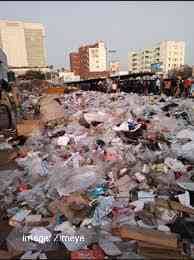Chantelle Bongubukhosi Ncube
OPERATION Chenesa Harare has been rolled out in the Capital City amid the sprucing up of the city ahead of the SADC Summit.
While the construction of the Mbudzi interchange has been pushed to meet deadlines, resurfacing of tarred roads taking precedence, vendors had been the last glaring feature in the new look Capital.
Vendors have to go.
The economic situation which has been dogging the country over several decades has forced many people to find means of survival. Many have taken to the informal sector, with vending being the easier of all.
Harare has seen vendors sprouting from nearly every corner if the vast City as citizenry try to ends meet.
This survival tactic is being threatened by Government through Operation Chenesa Harare to be carried out by the Harare City Council.
The main purpose of the Operation is to rid of Vendors from the CBD as the SADC Summit draws near.
Vending in Harare has become a way of life and the City is infested with people selling their wares such as groceries from their cars, firewood, second hand clothes, household appliances and utensils, tools, vegetables, cellphone accessories, children’s toys and many such wares that make a person gain a dollar to take home something to eat.
There is no area in the Harare CBD that is short of vendors.
The number of Vendors in undesignated areas has contributed to the dirt enveloping the Capital.
Harare’s Bold Move
Harare City Council Spokesman, Mr Stanley Gama underscored the significance and urgency of this initiative.
“Currently we are trying to ensure that our vendors operate from designated points. We have over half a million registered vendors in Harare and they continue to come for registration. They opt out problems for us as a city council, and they also create issues with the government. Together, we must eliminate the vendors,” he said.
Gama said Harare City Council is committed to a cleaner and more orderly city.
“Yes we are trying to ensure our vendors operate on vending points and there are designated vending point in the city that have been designed for this purpose of course so right now, what you see is us opening new ones. I believe around 4th and Copacabana, there will be a new element,” Mr. Gama said in an interview.
A similar Operation was attempted in the country’s second city Bulawayo but failed because of Zanu-PF party youths interference. While the City of Bulawayo tried to remove vendors from undesignated vending areas, the Party youths or apologists took them right back. A physical confrontation by vendors and Bulawayo Municipal police saw nine City Police being dragged to court on charges of firing rubber bullets on vendors.
Vendors resisted moving to designated points claiming that their livelihoods depend on vending in their self allocated strategic locations, which led to a resurgence of the informal trading in Bulawayo CBD.
Last year a study published in the Journal of Southern African Studies detailed how, when vendors were moved off the streets in Bulawayo by municipal authorities, their life chances took an immediate turn for worse with fewer earnings leading to deeper poverty. It is an example for the authorities in Harare to show how such an exercise might have negative socio economic impact on vendors and need a large scale program with a win-win situation.
The mass of vendors in Harare is daunting. In Zimbabwe, informal trading is a significant component of urban economy with as much as 60% of the workforce estimated to be informally employed according to figures from ZIMSTAT (Zimbabwe National Statistics Agency). As such, the plan by Harare City Council to relocate more than 500,000 vendors needs delicate handling to avoid causing economic instability.
In Harare, the sheer number of vendors presents a formidable challenge. According to the Zimbabwe National Statistics Agency (ZIMSTAT), informal trading forms a significant part of the urban economy, with an estimated 60% of the workforce engaged in informal employment.
While the goals of Operation Chenesa Harare are commendable, the execution must be handled with sensitivity and foresight. Creating adequate and accessible designated vending points is crucial, as is ensuring that these points are strategically located to maintain vendors’ customer base and income levels.
The Government and City Council must also engage with vendor associations to develop inclusive strategies that balance urban order and economic survival. Lessons from Bulawayo highlight the importance of community involvement and the provision of support systems for transitioning vendors.
As Harare moves forward with its urban renewal efforts, the success of Operation Chenesa Harare will depend on its ability to address the needs and realities of its large informal sector, ensuring that the city’s drive for cleanliness and order does not come at the cost of its citizens.
Zim GBC News©2024


